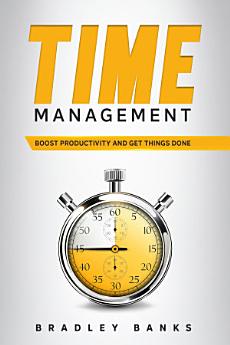Time Management: Boost Productivity and Get Things Done
Bradley Banks
Bradley Banks
4.2star
406 reviewsreport
Ebook
42
Pages
family_home
Eligible
info
reportRatings and reviews aren’t verified Learn More
About this ebook
There are certain proven methods as to how you can increase the efficiency of your time.
These methods collectively form the discipline known as time management. When you apply time management to your daily life you will reclaim vast quantities of time lost to simple mistakes and bad habits, providing you with the one thing everyone wishes they had ─ more time.
This book will explore numerous techniques that will help you manage your time effectively, making you more productive and efficient as a result.
Ratings and reviews
4.2
406 reviews
Phatsimo Chaane
- Flag inappropriate
May 2, 2025
If you're looking to take control of your time, boost productivity, and reclaim lost hours, Time Management by Bradley Banks is the perfect guide. Rather than offering vague advice, it provides a clear, step-by-step approach to improving efficiency and focus. Banks structures the book around practical strategies, breaking down time management into easy-to-follow steps. From identifying time-wasting habits to creating effective schedules, each section builds upon the last, helping readers gradually implement better routines. His examples bring these concepts to life, making them relevant for both work and personal goals. Beyond simply organizing tasks, the book highlights the importance of energy management—how to stay motivated, avoid burnout, and sustain long-term productivity. Banks also addresses common distractions and provides solutions to enhance concentration and minimize procrastination. I loved this book, would highly recommend
Tony Putter
- Flag inappropriate
September 27, 2025
What I appreciated about the book was that it was easy to read and a good reminder of the importance of managing our time. Nothing will change the fact that we all get only 24 hours each day. The key is not getting more time but focusing on how we spend it. Time is even more important than money, because it must be used for sleep, eating, exercise, and work — which already take up a large portion of the day. The book highlighted that bad habits eat away at our time, while building good habits consistently, day by day and moment by moment, is what truly makes the difference.
William C
- Flag inappropriate
January 3, 2024
This almost free pamphlet is a useful primer on time management. You've probably heard the tips like having a daily routine and avoiding distractions, but they are helpful reminders collected in one brief source. The author includes no citations, so his occasional claims that "many studies have shown" this or that must be taken with a grain of salt. The short book's writing us clear, slightly old-fashioned like a 1950s guide, and error-free.
Rate this ebook
Tell us what you think.
Reading information
Smartphones and tablets
Install the Google Play Books app for Android and iPad/iPhone. It syncs automatically with your account and allows you to read online or offline wherever you are.
Laptops and computers
You can listen to audiobooks purchased on Google Play using your computer's web browser.
eReaders and other devices
To read on e-ink devices like Kobo eReaders, you'll need to download a file and transfer it to your device. Follow the detailed Help Center instructions to transfer the files to supported eReaders.





